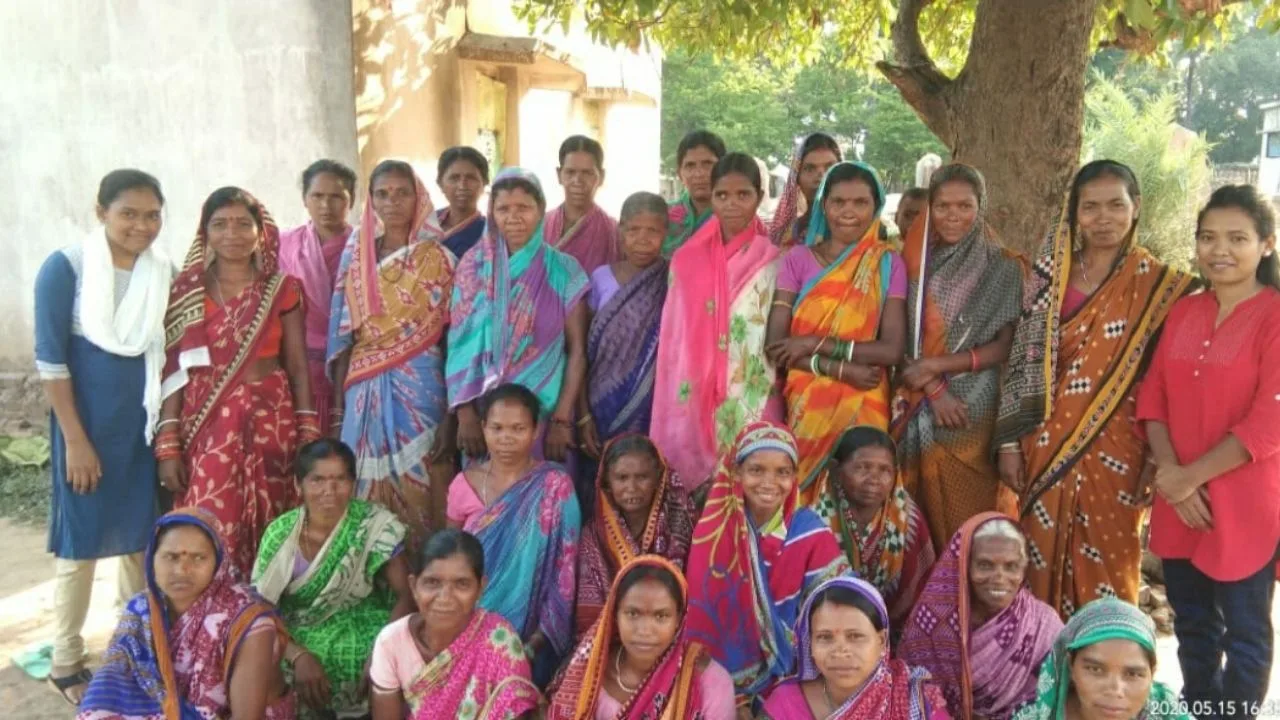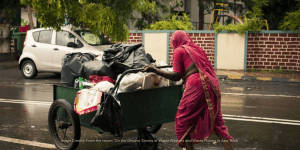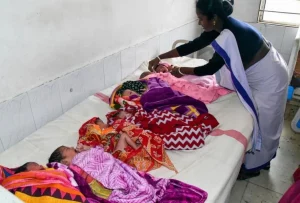A double blow for Adivasi Women Collectives

” We are unable to sell Mahul flowers in the market due to the lockdown. Lockdown has taken our livelihood away”, said Baijanti Kalo of Bamandagarh village in Jamankira Block of Sambalpur District in Odisha.
“ We can only eat rice and salt now. But there is no money to buy salt even”, she said in despair.
The lockdown imposed by the government of India to contain the Covid-19 pandemic has severely impacted the livelihood of marginalized forest dwellers, especially women like Baijanti of Kondh tribe, who depend on minor forest produce (MFP) for their livelihood. The minor forest produce that Adivasi women collect includes kendu leaf, mahua flower, mahua seed, siali leaf, siali seed, char seed, hill broom grass, tamarind, and honey. The months between March and June are peak minor forest produce season in Odisha.
90% of women from Adivasi and forest dwelling communities in Odisha depend on collection of minor forest produce for their livelihood. 8 out of 10 MFP gatherers are women.
Adivasi women make 60-70% of their income from selling the surplus of the forest produce.
During the last 3 months, Adivasi women led MFP cooperatives and collectives were unable to sell their produce because they neither had access to local markets nor could the traders procure them from their villages. This led to a distress sale at often much lower prices to the local traders.
“We usually sell siali leaf plates that we make at Rs 20 or Rs 22. During the lockdown, we have had to sell at Rs 15 or Rs 10. They are further going to bring down the price to Rs 5”, says Nibonti Pradhan, a Kondh Adivasi woman forest dweller of Sarumohan Village in Daringbadi Block of Kandhamal district.
Odisha which has 37.34% of land area classified as legally recorded forests is home to 62 Tribes, of which 13 are Particularly Vulnerable Tribal Groups (PTVG). 23% of the total population of the state are Adivasis according to Census 2011.
In a state where average landlessness in tribal districts is as high as 63.5% according to the Socio Economic Caste Census 2011, forests provide food security for upto 5 months. There are about 32,918 forest fringe villages with a population of 23.38 Million of which around 30 % belong to Scheduled Tribes according to the last Census conducted in 2011.
Odisha government’s delay in procuring the Minor Forest Produce collected by the Adivasi women’s collectives and stopping the procurement process altogether in the middle of the pandemic, a raging cyclone and ensuing economic vulnerability has hit the Adivasi women hard.
Tribal Women’s Collectives
[ Women MFP Collectives processing tamarind in Kandhamal district of Odisha, Photo Courtesy – Dhaneshwar Sahu, Antaranga Yuvak Sangh]
Women from the Adivasi and forest dwelling Communities in Odisha have formed various women-led Minor Forest Produce (MFP) cooperatives and collectives to collect, process and sell the minor forest Produce. These cooperatives are a source of financial security and economic empowerment for these women which has created spaces and agency for decision making in their villages.
According to estimates, 86% of the total rural Scheduled Tribe or Adivasi population in Odisha is critically dependent on Forests and Forest Resources for their survival.
According to the assessment of Vasundhara Odisha, an NGO working on Natural Resource Governance and Livelihood Enhancement of the Adivasi & Forest Dwelling Communities, the average income earned by the Adivasi and forest dependent households varies between regions- highest in western Odisha at Rs 15, 770, followed by Northern Odisha at Rs.13, 170 and Rs 11,250 in Southern Odisha.
The income earned from these women led cooperatives are shared among all the members of the cooperatives which has increased their bargaining power within their households and enabled them to invest in the children’s education.
Unspent and Underutilised funds of MSP for Minor Forest Produce (MFP)
At a time of such a crisis for the Adivasi women and their livelihoods, the ‘Minimum Support Price’ (MSP) Scheme for Minor Forest Produce , which if properly implemented could have mitigated the economic crisis for Adivasi women forest dwellers. Several tribal and forest rights advocacy groups have consistently demanded for the total implementation of the MSP Scheme for MFP and ensuring collection, storage and procurement of produce amidst Covid 19 Lockdown by the Tribal Development Co-operative Corporation of Odisha Limited (TDCCOL) which falls under the purview of the ST & SC Development Department, Govt of Odisha.
The Minimum Support Price (MSP) Scheme for Minor Forest Produce was an ambitious scheme of the Government of India, introduced in 2013 -2014 to provide fair and equitable price to the primary MFP gatherers. With 75% of cost against the Annual Procurement Plan contributed by the Ministry of Tribal Affairs (MOTA), Govt of India and 25% by the state governments, the losses also were to be shared in the same proportion. The tribal welfare department was to act as a state nodal agency for operationalization of the Scheme.
However, 7 years after the scheme was launched , MFP gatherers are unable to get fair and equitable prices, as the scheme has not been rolled out evenly in the states across India.
Between 2013 to 2020, the Central Government has released Rs 40169 lakh to 16 state governments. Along with the states’ share, the total funds under the MSP scheme stand at Rs 50211.71 lakhs. Of this, around 75 % is ‘Revolving Fund’ for Procurement of MFPs, while the rest around 25% is for infrastructure development.
Until the end of 2018-2019 , 77% of the funds under the MSP scheme earmarked for procurement are unspent. Only half of the 16 states have spent the grant for procurement of MFP under the scheme. All this unspent money hurts the procurement process and ultimately the livelihoods of Adivasi women.
Government Relief Measures- Too Little, Too Late
[Kendu Leaf collection in Kandhamal district, Odisha, Photo Courtesy – Dhaneshwar Sahu, Antaranga Yuvak Sangh]
After sustained advocacy by tribal and forest rights groups, the Ministry of Tribal Affairs, Govt of India, headed by Arjun Munda agreed to implement the MSP Scheme for MFP with the existing grants lying with the states.
Odisha Revenue and Disaster Management Department, on 13 April 2020, exempted the collection, storage and processing of non-timber forest produce (NTFP) and Kendu leaf from the Covid-19 lockdown rules . The Ministry of Home Affairs later exempted the Collection & Processing of all Minor Forest Produce from lockdown rules.
The Ministry of Tribal Affairs, on 1st May 2020, revised & increased the Minimum Support Price (MSP) for Minor Forest Produce (MFP) of 50 items ranging from 16% to 66%. On 29th May 2020, the Ministry of Tribal Affairs announced the inclusion of 23 Additional MFP under the Minimum Support Scheme.
However, information regarding the revised MSP prices did not percolate to the Adivasis and first dwelling communities forcing them to sell their produce at below market rates.
“We Sold Mahua to local traders at Rs 15, we didn’t know about the revised MSP. No one from the government came to purchase or tell us. We do not have TV or radio, how will we know of the MSP?”, Moti Dhibar, president of the Bana Ganga Mahila Utpadak Sangh, a women’s MFP Collective, in Chandiposi village of Deogarh district told us. “In any case, we had to sell because we had no space to store”, she said.
These measures, though a relief, came a little late. Mahua trade, which had already been affected by the Covid-19 lockdown, saw little respite as these measures came at the end of the season.
Even this relief did not last long. Soon after, on 20th May 2020, Odisha was battered by the Amphan Cyclone.
Cyclone Amphan- A Double Whammy
The Amphan Cyclone, an extremely severe cyclone packing winds of up to 190 kmph has added a further blow to the forest based livelihoods of the Adivasis and forest dwelling communities.
“ First, the Sal Leaf Trade was closed and Kendu leaf collection was delayed due to lockdown.. Now the Amphan Cyclone has destroyed the Kendu leaf, which has been infected by insects. We will have to stop the collection because of poor quality”, said Sunai Pradhan, a Kondh Adivasi, MFP Gatherers from Dhengajhari in Nayagarh district.
Sal seed, which had a bumper crop this year and could have saved the livelihoods of the Adivasis, was destroyed due to the unseasonal rains and cyclone. Odisha faces unseasonal rains and cyclones, which affects the forest based livelihood and minor forest produce trade of Adivasis, the government fails to make any special efforts to mitigate this livelihood loss.
“Last year, I collected 4 Quintal Mahul and earned more than Rs 10,000. This year, I could only collect 30 kg, I won’t even get Rs 1000”, said Haripriya Kalu of Tileibani Block in Deogarh district.
“When there is crop loss, the government gives benefit to farmers for crop loss, but nothing to Adivasis for loss of minor forest produce. We should get crop loss benefits too”, she added.
Odisha Government Stops Procurement of MFP
In the middle of already precarious livelihood conditions for Adivasi women, the Tribal Development Co-operative Corporation of Odisha Limited (TDCCOL), stopped the procurement of Sal seed, tamarind and other minor forest produce under the Minimum Support Price Scheme, citing the onset of monsoon. This has been devastating for the Adivasi women and MFP collectives.
[GO stating the stopping of procurement process of MFP by TDCCOL. Odisha]
Taking advantage of this, local private traders are forcing the Adivasi women to sell the Sal seeds at Rs 5 – Rs 8 per kg much below the revised Minimum Support Price of MFP of Rs 20 .
Women led MFP Collectives & MFP Gatherers of Adivasi & forest Dwelling Communities of Deogarh, Kalahandi, Koraput, Mayurbhanja, Sundergarh, Raygada and Sambalpur district of Odisha have started distress sell at these rates.
For Johani Soreng and Shalini Baa of the Khadiya Tribe, from Baliposh Village in Sundergarh district, the revision of MSP of Sal seed would have secured their livelihood during the Monsoon as they had a bumper crop this year.
“We had Collected 100 quintal & 36 Kg of Sal Seed this year. At MSP rates we could have Rs 2720. Since the TDCC stopped procurement, we were forced to sell at Rs 8 to the small traders and received Rs 1088. This is less than what we made last year when we sold at Rs15”, they said.
The Gram Panchayats of Kantabahal, Adas, Lulang, Tabada, Bagbar, Guhida in Reamal Block of Deogarh District have written a letter to the Collector of Deogarh District protesting against the closure of the procurement of MFP.
What Governments Need To Do
The state government of Odisha & Tribal Development Cooperative Corporation (TDCC) need to inform Adivasis and forest dwelling communities of the revised MSP for MFP Schemes to enable them to sell their produce at fair prices.
“We know that TDCC purchases MFP, but it has never come to our village”, said Haripriya Kalu (Kondh Tribe).
The State Government should further ensure institutional mechanisms such as primary procurement agencies, district and state level committees for the MSP for forest produce are functional and procurement is ensured.
“Now the Sal Seed has come, we request the Govt to procure it at Rs 20 per Kg under the MSP Scheme. We are facing a lot of problems as the government schemes are not implemented”, Fuljencia Tete, a forest produce gatherer from the Khadiya tribe from Burodihi Village, (Kuchinda Block) of Sambalpur district told us.
The State Government should come out with special provisions and safeguards for the Adivasi & Forest Dwelling Communities to compensate their crop loss due to disasters.
Government could boost tribal economy by procuring Sal and Siali leaf plates stitched by Adivasi women for the quarantine centres
The Pradhan Mantri Van Dhan Yojana, which in 2018, made a provision for formation of Van Dhan Kendras to offer skills training and business opportunities for MFP gatherers would also enhance & secure the livelihood of the Adivasi & Forest Dwelling Communities amidst this Covid-19 crisis.
Closure of procurement of MFP by the TDCC has had a massive effect on the livelihood of the Adivasi & Forest Dwelling Communities of Odisha, specially women MFP gatherers & collectives. Income earned from MFP is used for the education of their children, their food security during monsoon and also agriculture activities,especially during the Rabi season.
The TDCC Odisha should extend the Procurement of MFP under MSP at least until 30th June to prevent the distress sale of MFP and secure their livelihoods.
[Archana Soreng and Ranjita Pattnaik members of Research Team at Vasundhara Odisha- an NGO working on Sustainable Livelihood & Economic Democratization, Natural Resource Governance & Tribal Rights based in Odisha, India]
We believe everyone deserves equal access to accurate news. Support from our readers enables us to keep our journalism open and free for everyone, all over the world.







